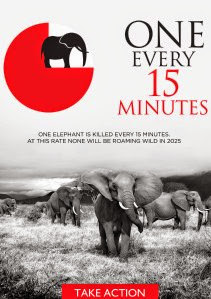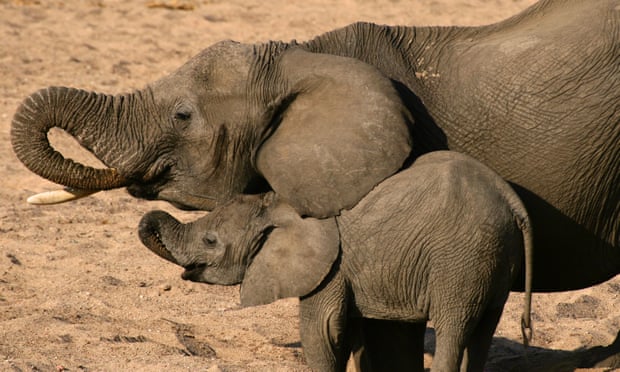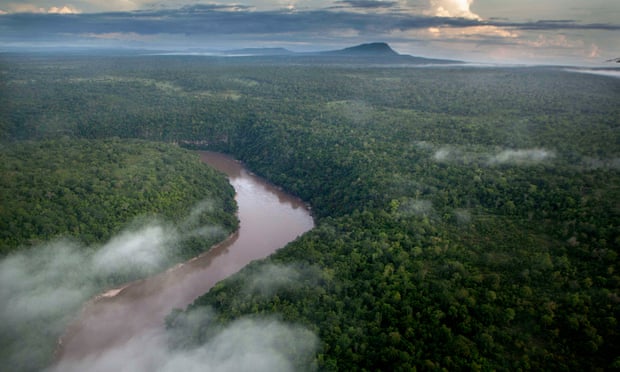~~~~~~~~~~~~~~~~~~~~~~~~~~~~~~~~~~~~~~
The wounded elephant was saved after pleading humans for help: Animal approached safari lodge after it was shot by poachers

Continue reading and see more images
The Bumi Hills Safari Lodge, where the wounded elephant went to ask for help.
The bull elephant, named Ben, surprised guests when he approached the Bumi Hills Safari Lodge in Zimbabwe. But manager Nick Milne soon realised that the animal was suffering with a limp and appeared to be severely injured.
The in-house vet was gone for the weekend so another was called and volunteered to fly 200 miles to help the elephant. In the six hours it took for him to arrive, Ben is said to have waited patiently earby, drinking water and grazing.
Experts tranquillised him and, after further examinations, found a deep wound in his shoulder suspected to be the result of a poacher's bullet.
To their horror, they then also found two bullet holes in one of his ears making it likely that the animal had survived two attempts on his life.
The animal wears a tracking device so experts can monitor his improvement.
Ben is now healing on the property after his wounds were disinfected and treated by the vet.
Source
~~~~~~~~~~~~~~~~~~~~~~
RELATED
October 2015
DOZENS OF ELEPHANTS POISONED BY THEIR OWN CARETAKERS IN ZIMBABWE HWANGE NATIONAL PARK over pay dispute
- They mutilated the animals and made off with their tusks
READ MORE
~~~~~~~~~~~~~~~~~~~~~~~
Elephants could vanish from one of Africa's key reserves within six years

Mother and baby at Tanzania's Selous National Park
Their survival prospects are dim.
THE GUARDIAN - Elephant populations in Tanzania’s Selous national park could collapse unless poaching and mining are urgently controlled, say WWF
Elephants could disappear from one of Africa’s most important wildlife reserves within six years unless industrial scale poaching is stopped and mining is brought under control, the WWF has said.
Victims of industrial-scale poaching
Selous national park, a world heritage site in southern Tanzania, has lost an average of almost 2,500 elephants a year since the 1970s.
But it has now reached a crtitical stage with only about 15,000 left, according to the latest census.
“The population is at an historic low. and urgent measures are required to protect the remaining animals and return the population to a stable and sustainable size. If this trend continues, elephants could vanish from Selous by early 2022,” says the WWF in a new study.
But the park, which is also home to lions, leopards, wild dog, buffalo, hippo, crocodile and over 400 bird species, is also threatened by large scale mining.
Wildlife poisoned by toxic uranium mining and oil and gas extraction
Nearly 75% of Selous is covered by oil and gas concessions, and 54 mining concessions have been awarded.
Mining could lead to water pollution and environmental degradation, says the report. “Extractive industries cause environmental degradation, including the destruction of wildlife habitats in the immediate area around exploration sites.
In 2012, the boundary of the Selous World Heritage site was modified to enable the construction of a large scale uranium mine in the southern area of the reserve. Once operational, the mine is expected to produce about 60m tons of poisonous radioactive waste,” says the study.

The Rufiji River winding through the Selous game reserve. What at some time in the past must have been a pristine environment, today is the site of mining poisoning and out-of-control poaching of wildlife - the result of human greed and cruelty.
Only 40 years ago Selous had nearly 110,000 elephants. But two waves of poaching have reduced numbers by 90%.
By 2007 the population in the broader ecosystem which extends beyond the park, was down to 70,406.
The second wave of poaching took place between 2010 and 2013 when an average of six elephants were killed every day by poaching syndicates.
The reserve currently generates $6m in annual revenues, which are distributed between the reserve, the national government, and more than 1.2 million people living in the surrounding area.
“The income-generating potential of the site relies on its large wildlife populations and pristine natural ecosystems. The loss of elephants and the degradation of habitats reduces Selous’ appeal to tourists, and also threatens the vital ecosystem services that it provides to local communities, such as water provision and carbon sequestration.
“If left unchecked, harmful industrial activities and poaching will dramatically reduce the value of the reserve, making it difficult for the site to provide sufficient wildlife protection or to become economically self-sustaining.”
The authors of the study urge the Tanzanian government to conduct a full social-economic valuation to assess the direct, indirect and non-use values of Selous to determine the impact of the proposed mining activities on Selous.
“The Tanzanian government should place equal value on the needs of current and future generations, and favour activities that drive long-term sustainable development and permanent job creation, such as carefully managed tourism, over those that prioritize profit in short-term such as oil, gas and mineral extraction,” says the study.
Source
~~~~~~~~~~~~~~~~~~~~~~~~~~~~~
Friday, December 19, 2014
BABY ELEPHANT MOURNS HIS MOTHER
THE ONGOING MASSACRE OF ELEPHANTS
And how rescue centers that care for orphans only to release them into the wild to be killed, are unwittingly working for the poachers
Orphans are saved and rehabilitated, only to be released into the wild to be murdered by poachers.
Thus these centers caring for elephant babies are unwittingly working for the poachers by raising the animals until they are big enough to be killed.
Perhaps the public should demand that rescue organizations must place elephants INDEFINITELY in safer natural reserves that are small enough to be protected by enough armed guards.
The notion that these wonderful animals bordering extinction can continue to live in the wild comes from a state of complete denial of reality.
|
Daily Mail - Heartbreaking moment orphaned baby elephant mourns the death of her mother after she was killed by a poacher's poisoned spear.
This is the heartbreaking moment that an orphaned baby elephant mourns the death of her mother after she was killed for her ivory tusks by a poacher's poisoned spear.
In the footage, the traumatised animal, named Roi, is seen standing over her mother's dead body following the brutal raid.
Just 24 hours earlier, the endangered animals had been photographed playing happily together in Kenya's Masai Mara National Park.
The 10-month-old orphan temporarily joined another herd, but faced starvation without her own mother's milk.
Luckily, Roi was later taken to safety after a dramatic rescue by wildlife experts.
During the complex operation, the youngster was manoeuvred away from the herd, tranquillised and put on a plane.
Roi was then taken to The David Sheldrick Wildlife Trust Elephant Orphanage in Nairobi National Park, where trained keepers are now caring for her.
Rob Brandford, UK Director of the David Sheldrick Wildlife Trust, said: 'Roi arrived in good health but was clearly traumatised from witnessing the death of her mother.
'She took milk from the keepers early but was wary and understandably a little nervous around her new surroundings, not trusting the keepers. Once she met the other orphans, she was immediately comfortable and content.
'The older elephants paid her attention and provided her with the love and affection she craved and missed. As the days have passed little Roi has settled in completely and is now extremely attached to her keepers, familiar with the routine and is playing once more - she is a confident little elephant.'
Ivory poaching is a huge problem in Africa, killing one elephant every 15 minutes.
The David Sheldrick Wilfdlife Trust is hoping to raise £15,000 to save more baby elephants like Roi who are orphaned by poaching. Mr Brandford said: 'Arriving as a fragile baby, Roi would not have survived without our intervention and she has now been afforded a second chance.
'We have 82 infant elephants reliant on us right now and we need to be ready to provide the same life-saving care for other orphaned elephants in need.'
To donate to support the trust's work, visit: www.sheldrickwildlifetrust.org
Just 24 hours earlier mom and baby had been photographed together.
Source - http://www.dailymail.co.uk/news/article-2879816/Heartbreaking-moment-orphaned-baby-elephant-mourns-death-mother-killed-poacher-s-poisoned-spear.html
More articles on elephants on this blog
http://ottersandsciencenews.blogspot.ca/search/label/Animals%20-%20Elephants
Link to the above baby elephant story:
More elephant stories on this blog
No comments:
Post a Comment
Thank you for visiting my blog. Your comments are always appreciated, but please do not include links.